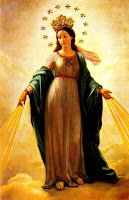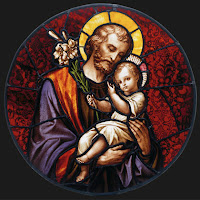The lectionary for this year takes the Sunday Gospel readings
from the Gospel according to St. Mark, which is the shortest of the 4 gospels.
Because of its brevity, the Gospel of St. Mark cannot suffice for all the
readings of the year. Thus, we shall have a short break in the Markan series to
give way to 4 Sundays of reading from the Eucharistic chapter of St. John’s
Gospel. This chapter begins with today’s account of the multiplication of the
loaves, which, contrary to the explanation by many preachers today, is more
than just an account of Jesus encouraging his listeners to share their
resources but is an actual miracle that prefigures the Holy Eucharist. The
Catechism of the Catholic Church points out: “The miracles of the
multiplication of the loaves, when the Lord says the blessing, breaks, and
distributes the loaves through his disciples to feed the multitude, prefigures
the superabundance of this unique bread which is the Eucharist.” (CCC, 1335)
This superabundance of the Eucharist is best shown by the fact that even with
so little (5 loaves and 2 fish), a crowd of five thousand men ate and have had
their fill and the left over filled 12 wicker baskets “that had been more than
they could eat.” In this way, the prophecies of Elisha came to pass: “Thus says
the Lord, ‘They shall eat and there shall be some left over.”
Here we see the limitation of man and the superabundance of
God. Man asks: “How can I set this before a hundred people?” “200 days’ wages
worth of food would not be enough for each of them to have a little.” Our tendency
is always to say: it is not enough…it is never enough: “What good are these for
so many?”
But the Lord “himself knew what he was going to do.” He feeds
us from what is offered to him. In the 1st reading, the people were
fed from 20 barley loaves made from the first fruits. In the gospel, the men
were fed from the boy’s offering of 5 barley loaves and 2 fish. And this is
what he does in the Eucharist. The superabundance of God’s gift begins with the
humble gifts that are offered to him: “Blessed are you, Lord, God of all
creation, for through your goodness we have received the bread we offer you…the
wine we offer you; fruit of the earth (fruit of the vine) and work of human
hands, it will become for us the bread of life…it will become our spiritual
drink.” In fact, you may notice that even what we offer him, we ourselves have
received for the fruit of the earth and of the vine ultimately come from God.
Yes, our human hands may have worked to make bread and wine but let us keep in
mind that we worked only on what we have received: wheat and grapes. This is
why we come to ask: What is it that we offer and have not received in the first
place?
And these humble gifts brought to the altar are transformed
into what cannot be made by human hands: the Body and Blood of Christ himself.
“…the priest’s words of consecration change what is simply bread into all that
you are, what is simply wine into all that made heaven and earth…” (ANF, Ritual of the Ordinary Vigil, p. 34.) The
Church “commits the Creator’s gifts into the hands of Christ who, in his
sacrifice, brings to perfection all human attempts to offer sacrifices.” (CCC,
1350) An offering that begins seemingly as something so little, humble, and
insufficient is transformed into something great, awesome, and superabundant:
it becomes the Lord himself – the Lord who opens his hands and satisfies the
desire of every living thing. “The Eucharist is an unfathomable mystery itself.
It is as inexhaustible as God himself because it is a divine mystery. It is a
mystery that one never finishes understanding…‘Has the human language
sufficient words to express what the Eucharist is? A truly indescribable
mystery! Simple with the greatest simplicity! Rich with supreme richness!’
(John Paul II, Mass in Regio Calabria
June 12, 1988)” (F. Stoeckl, John Paul II
and the Mystery of the Eucharist, p. 23.)
Jesus, I trust in you! O Mary conceived without sin, pray for
us who have recourse to thee!










No comments:
Post a Comment